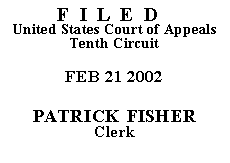

| CAINEY ROBERTS, JR.,
v.
CHARLES RAY, Warden; THE
ATTORNEY GENERAL OF THE
STATE OF OKLAHOMA |
|
Before SEYMOUR, Circuit Judge, BRORBY,
Senior Circuit Judge, and
LUCERO, Circuit Judge.
Mr. Cainey Roberts, Jr. appeals the district court's denial of his federal
petition for a writ of habeas corpus brought pursuant to 28 U.S.C. § 2254. This
court has jurisdiction pursuant to 28 U.S.C. §§ 1291 and 2253. Mr. Roberts
claims he is entitled to habeas relief because the Oklahoma Court of Criminal
Appeals violated ex post facto principles when it applied Parker v.
State(1)
to his direct appeal. Mr. Roberts argues Parker was an unexpected and unforeseeable new rule of law and the application of Parker in his direct appeal(2)
denied him due process of law.
Mr. Roberts acknowledges his argument hinges on whether this court
determines Parker was unforeseeable. This court recently held the result in
Parker was foreseeable. Sallahdin v. Gibson, 275 F.3d 1211, 1228 (10th
Cir.
2002).(3)
Entered by the Court:
WADE BRORBY
United States Circuit Judge
*. This order and judgment is not binding precedent except under the doctrines of law of the case, res judicata and collateral estoppel. The court generally disfavors the citation of orders and judgments; nevertheless, an order and judgment may be cited under the terms and conditions of 10th Cir. R. 36.3.
1. Parker v. State, 917 P.2d 980, 985-86 (Okla. Crim. App. 1996) (defective criminal information raises due process concerns, but is not fatal to jurisdiction), cert. denied, 519 U.S. 1096 (1997), overruled Miller v. State, 827 P.2d 875, 879 (Okla. Crim. App. 1992) (criminal information must specifically allege each element of the crime to confer jurisdiction on the trial court).
2. Contrary to the contentions in Mr. Roberts' brief, the state appellate court did not apply Parker in his direct appeal. Roberts v. State, No. F-93-482, slip op. at 3-4 (Okla. Crim. App. May 1, 1996) (unpublished opinion). Rather, the court relied on an unpublished opinion, Masquat v. State, No. F-93-1369 (Okla. Crim. App. July 26, 1996). Masquat held "[t]he term 'premeditated design' ... was sufficient in this Information to set forth the element of malice aforethought." Id. at 4. Obviously, the result in Masquat does not bode well for Mr. Roberts and may explain his decision to submit an ex post facto argument to this court. Nevertheless, we acknowledge Mr. Roberts' reliance on Parker in his ex post facto argument before this court and dispose of his claim accordingly.
3. Sallahdin was decided after we heard oral argument in this case.